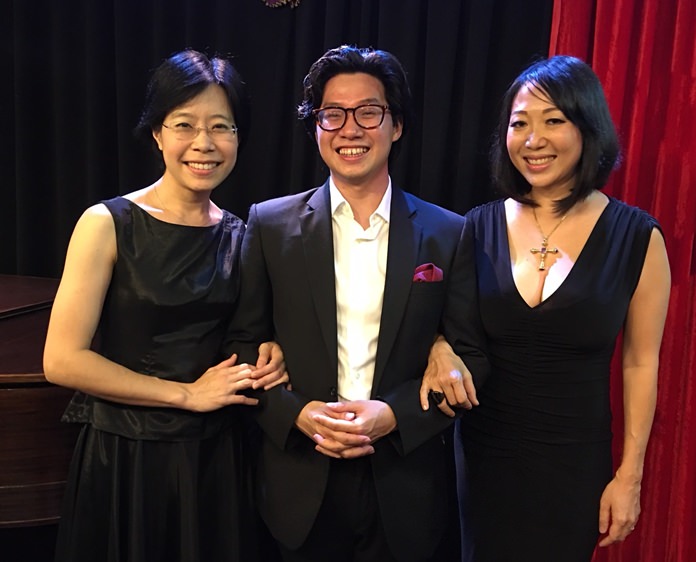
Take a Thai pianist, a Japanese soprano and a Singaporean tenor (and some music of course) and you have the ingredients for an enjoyable musical evening. This was the line-up at Ben’s Theater recently when three international musicians joined together for a programme of vocal music.
 The concert opened with an instrumental item: an attractive performance of three of the Nocturnes for Piano by the French composer Francis Poulenc by Ami Napawan. She provided all the piano accompaniments at the concert yet studied political science for her undergraduate studies and was awarded a degree in International Relations from Chulalongkorn University. It was not until her postgraduate study that Ami decided to return to music studies at the College of Music at Mahidol University where she received her Master in Music degree. She gave a competent performance of the piano pieces and brought a pleasing reflective quality to the haunting Les cloches de Malines.
The concert opened with an instrumental item: an attractive performance of three of the Nocturnes for Piano by the French composer Francis Poulenc by Ami Napawan. She provided all the piano accompaniments at the concert yet studied political science for her undergraduate studies and was awarded a degree in International Relations from Chulalongkorn University. It was not until her postgraduate study that Ami decided to return to music studies at the College of Music at Mahidol University where she received her Master in Music degree. She gave a competent performance of the piano pieces and brought a pleasing reflective quality to the haunting Les cloches de Malines.
Japanese soprano Ayano Schramm-Kimura opened her recital with an aria from Alfredo Catalani’s curiously named opera La Wally, which is actually an abbreviation of the name of Walburga, the heroine of the opera. From the first few notes, I was struck by the beauty of Ayano’s tone which is soft and appealing in the lower register. It was followed by arias by Bellini and Verdi but for me the Catalini remained the highlight.
Ayano began her musical studies at the age of four in Tokyo. When she was fifteen, she was accepted at Rugby School in Britain, where she excelled in piano and singing. In later years she completed her Master’s degree of Music Performance at Mahidol University.
Singaporean tenor Brendan-Keefe Au started singing at the age of twelve in the Anglo-Chinese School choir where he was a student. His opening number was the popular tenor aria Una Furtiva Lagrima from Donizetti’s 1832 comic opera L’elisir d’amore. He has a powerful voice and particularly effective in the quieter sotto voce passages. His intonation is good too, which to mind is essential for a singer. It might sound obvious, but I have heard so many singers – even professional ones – who regularly sing out of tune. Brendan-Keefe is also technically assured and one of the highlights was his dramatic performance of the aria Si, ritrovarla io giuro from Rossini’s opera La Cenerentola. Rossini completed the opera in a mere three weeks, or so he said. He was twenty-five at the time and was basking in the success of the better-known opera Barber of Seville which had been first performed the previous year.
The second half of the concert opened with Ayano’s performance of the song Chère Nuit by the little-known French composer Alfred Bachelet. It was a good start, though I thought that her performance of Wagner’s aria Gebet der Elisabeth was much more successful because it is quiet for most of the time and allowed Ayano’s striking tone quality to come through. Her tone quality in the quieter passages is pure and refined.
Brendan-Keefe Au returned to the stage for his performance of Meyerbeer’s aria Je crois entendre encore from the opera L’Africaine (The African Woman) by Giacomo Meyerbeer, considered one of the most successful stage composers of the nineteenth century. Brendan-Keefe gave a good solid performance of the aria with excellent high vocal tone and a sympathetic piano accompaniment from Ami Napawan. Another highlight of the evening was the song Chanson Triste by the French composer Henri Duparc, in which the singer’s well-controlled voice showed at its best.
Brendan-Keefe Au is a graduate of the National University of Singapore and he holds a First Class Honours degree in Social Sciences and has also studied Law. He concluded his set with two songs by Kurt Weill; a dramatic performance of the song Surabaya Johnny from the 1929 musical Happy End followed by the tango Youkali also by Kurt Weill.
Ayano returned for the last number, the appropriately chosen song I’ll See You Again by Sir Noël Coward. The singers gave an engaging performance of the song and as their encore sang There are fairies at the bottom of our garden, the setting of a poem written (in all seriousness) by the English writer Rose Amy Fyleman and later set to music by Liza Lehmann. The camp and over-the-top performance was much appreciated by the audience and brought the last concert of the season to a lively conclusion.





